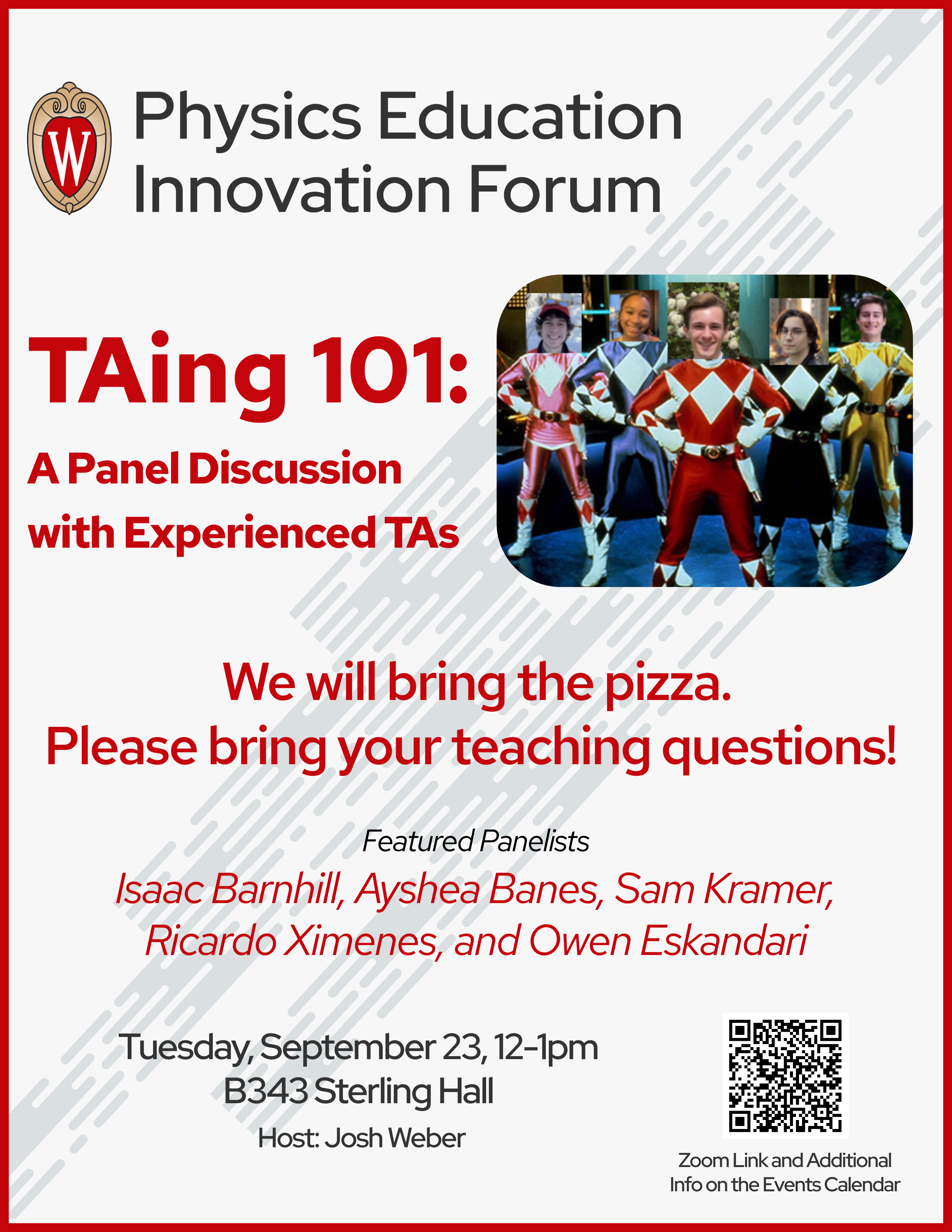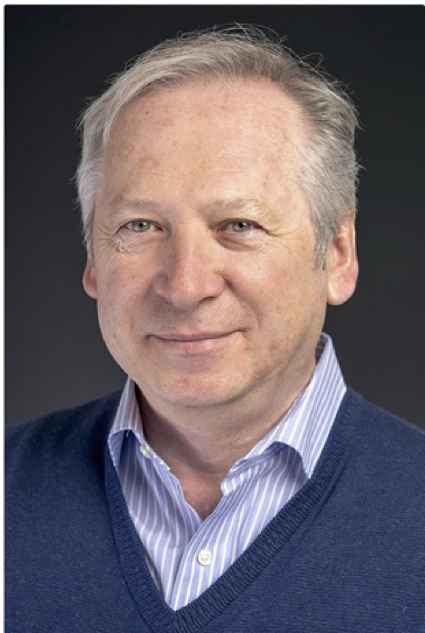Events During the Week of September 21st through September 28th, 2025
Monday, September 22nd, 2025
- Theory Seminar (High Energy/Cosmology)
- The Measure Problem and the beginning of the Universe
- Time: 1:00 pm - 2:30 pm
- Place: Chamberlin 5280
- Speaker: Bjoern Hassfeld, UW-Madison
- Abstract: Making predictions (even statistical) for future measurements becomes a highly nontrivial theoretical challenge if the underlying fundamental theory of consideration allows for more than one solution. String Theory with its large landscape of solutions is a prime such example. After explaining why it is difficult to construct a measure on the space of the outcome of future measurements, a possible measure for the multiverse is presented. It turns out that the beginning of the universe plays an important role for making predictions. An overview over old and new proposals thereof will be given. Event recording:
- Host: Jakob Moritz
Tuesday, September 23rd, 2025
- Physics Education Innovation Forum
- TAing 101: A Panel Discussion with Experienced TAs
- Time: 12:00 pm - 1:00 pm
- Place: B343 Sterling Hall
- Speaker: Isaac Barnhill, Ayshea Banes, Sam Kramer, Ricardo Ximenes, and Owen Eskandari, UW-Madison

- Abstract: The PEI Seminar hosts monthly presentations and discussions about new ideas in teaching physics. For the first meeting of the semester, a panel of experienced TAs will share their knowledge. We will bring the pizza. Please bring your teaching questions!
You are welcome to join via Zoom with the meeting code 302 365 8376. A Zoom recording will be available upon request. Contact Josh (jjweber3@wisc.edu) to access the recording. - Host: Josh Weber
Wednesday, September 24th, 2025
- No events scheduled
Thursday, September 25th, 2025
- R. G. Herb Condensed Matter Seminar
- Manipulating Valley Degree of Freedom via Nano-gating and Twist
- Time: 10:00 am - 6:00 pm
- Place: 5310 Chamberlin
- Speaker: Ke Wang, UMN
- Abstract: Within condensed matter physics, the study of two-dimensional (2D) systems is a diverse and active field of interest with a rich history. High-quality two-dimensional electron gases (2DEG) in GaAs/AlGaAs heterostructures have enabled the discovery of rich quantum Hall physics. With the help of electron-beam-defined nano gates, system dimensions can be further reduced to be mesoscopic and comparable to the electron wavelength. In such gate-defined nanostructures, novel quantum phases can be locally defined and coherently manipulated to realize quantum bits and quantum interferometers, providing versatile experimental platforms to answer many key questions in condensed matter physics.
Since the discovery of graphene via mechanical exfoliation, it has been shown that the electronic properties of solids can undergo dramatic changes when the material thickness is reduced to the atomic limit. Moreover, the properties of the 2D materials can be further tailored by stacking them with relative twist angles. Combining this designer material platform with the gate-defined nanostructures, the highly tunable local Hamiltonian allows a local probe to the rich underlying physics and a platform to study new mesoscopic quantum phenomena. In this talk, I will discuss our recent experiments in tuning valley-specific Berry curvature and band topology in bilayer graphene via gate-defined nanostructures and twist, towards investigating novel mesoscopic quantum physics and demonstrating new quantum device concepts.
- Host: TIANCHENG SONG
- NPAC (Nuclear/Particle/Astro/Cosmo) Forum
- Recent Advances in Modeling Cosmic Ray Observations and New Developments in Telescope Array Data Analysis
- Time: 2:30 pm - 3:30 pm
- Place: Chamberlin 5280
- Speaker: Anatoli Fedynitch, Academia Sinica, Taiwan
- Abstract: Understanding the cosmic ray flux is essential across astroparticle physics. The observed spectrum and mass composition provide critical inputs for modeling atmospheric muons and neutrinos, dominant backgrounds in neutrino observatories, and for applied fields such as muon tomography. In 2017, we introduced the Global Spline Fit (GSF), an agnostic framework designed to let data guide the modeling with minimal assumptions. Nearly a decade later, new results from space-based observatories (AMS, DAMPE, CALET) and dedicated measurements near the knee (GRAPES, LHAASO) enable a substantial update. I will present the next-generation GSF2025 and discuss its implications for our global view of cosmic rays from GeV to EeV. In the second part of the talk, I will highlight our group’s ongoing effort to reinvent the analysis chain of the Telescope Array surface detectors. Leveraging deep neural network–based reconstruction, we address systematic uncertainties that stem from the unknown mass composition, achieving significant improvements in energy and angular resolution. This approach also opens new possibilities for inferring primary mass and Xmax in future iterations. To rigorously propagate uncertainties, we have developed a Bayesian forward-folding framework that naturally incorporates both intrinsic and external constraints into the measurement’s error bands.
- Host: Lu Lu
Friday, September 26th, 2025
- Physics Department Colloquium
- How to Improve a Modern Radiation Treatment of Cancer: A dream? Naivety? Arrogance? ... Or a Necessity?
- Time: 3:30 pm - 4:30 pm
- Place: Chamberlin 2241
- Speaker: Karol Lang, University of Texas at Austin

- Abstract:
About 50% of all cancer patients are subjected to radiation therapy that may be further improved by broader use of proton treatment and better monitoring of the result of each therapeutic radiation session. The in-vivo image-guidance and dosimetry of proton irradiations, generically known as proton range verification, are some of the most underinvested aspects of radiation oncology. They trail behind other advances in radiation therapy due to the scarcity of sensitive instruments compounded by the lack of treatment protocols for precision monitoring of effects of beam radiation. This is despite that such measurements may dramatically enhance the treatment accuracy and lower the post-radiation toxicity, thus improving the entire outcome of cancer therapy. We will discuss the motivation of designing and building a positron-emission-tomography (PET) scanner for assisting in proton irradiations. It is critical that proton therapy becomes more accessible and of better quality as an essential component of “precision personal medicine” that is currently beginning to shape modern medicine. We also present selected results of our pre-clinical experiments with a FLASH proton beam and discuss other related ideas towards improving and expanding the use of PET detectors for proton therapy.
Mini-biosketch:
Karol Lang is the Jane and Roland Blumberg Professor of Physics at the University of Texas at Austin, where he teaches and conducts research in experimental particle physics and in nuclear medical imaging. He received his M.Sc. in Physics from the University of Warsaw, and his Ph.D. from the University of Rochester.
Karol Lang has participated in experiments conducted at accelerators at Fermilab, SLAC, BNL, and CERN, and underground laboratories in Soudan, Modane and Gran Sasso. Currently, he is involved in the Fermilab program to study long baseline neutrino oscillations and in experiments designed to search for neutrinoless double beta decay. As a spinoff of these experimental programs, he is also involved in research to develop and employ high sensitivity positron emission tomography (PET) scanners for the in-beam image-guided proton therapy, elucidation of the FLASH effect, and the total body imaging.
- Host: Brian Rebel
Saturday, September 27th, 2025
- UW Madison Physics Department Picnic
- Time: 11:30 am - 1:00 pm
- Place: Rennebohm Park, 115 N. Eau Claire Ave
- Host: Sharon Kahn